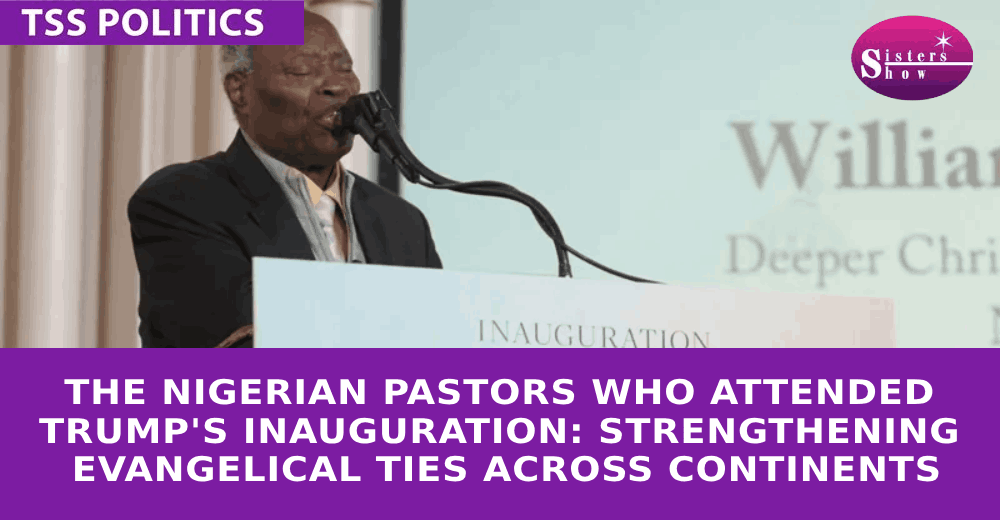
The Nigerian Pastors Who Attended Trump’s Inauguration: Strengthening Evangelical Ties Across Continents
Two prominent Nigerian pastors, William Kumuyi and Nathaniel Bassey, made headlines when they participated in events surrounding the inauguration of U.S. President Donald Trump in January 2017. Their presence underscored the growing influence of Christian evangelicalism in U.S. politics, as well as the strengthening ties between American conservative political figures and evangelical leaders in Africa.
While both pastors hail from Nigeria, their attendance at such a high-profile event highlighted a unique intersection of faith, politics, and international diplomacy. Their participation also revealed how religious figures in Africa are being leveraged to bolster Trump’s standing both at home and abroad.
Pastor William Kumuyi’s Role
William Kumuyi, a former mathematics professor, is the founder of Deeper Life Bible Church and convener of the global evangelistic initiative, Global Crusade with Kumuyi. His church attracts 120,000 attendees weekly, marking it as one of the largest in Africa. Kumuyi’s invitation to the Trump inauguration was somewhat unexpected, considering that no African heads of state were included on the guest list. Instead, Kumuyi attended a prayer service for the incoming president and met with conservative political groups during his visit.
Kumuyi, who is known for his influential role within evangelical circles in Africa, posted on social media about his interactions with U.S. lawmakers from Turning Point USA, a conservative youth organization. The main goal of his meetings was to explore potential partnerships for global evangelism. Additionally, Kumuyi offered a prayer at the Inauguration Praise & Prayer Convocation, which was hosted by U.S. pastors Jim Garlow and Tony Perkins, leaders of the Family Research Council, a prominent evangelical group in America.
Kumuyi’s presence at the inauguration aligns with his ministry’s mission to promote religious freedom worldwide. In a statement, he emphasized his participation was to celebrate the return of religious freedom in America and express support for other nations fighting religious persecution. This echoes President Trump’s consistent advocacy for religious rights, a cornerstone of his presidency. In 2019, Trump held the first-ever meeting of foreign ministers focused solely on religious freedom, and his administration often framed religious liberty as a key priority in foreign policy.
Nathaniel Bassey’s Role
The other Nigerian pastor who made waves during the inauguration events was Nathaniel Bassey, a widely recognized gospel musician, pastor, and trumpeter from Akwa Ibom in southern Nigeria. Bassey’s claim to fame is his viral social media initiative, the Hallelujah Challenge, which gained millions of followers across the world. Through this program, Bassey connected Christians globally, inviting them to join in daily online worship sessions.
Bassey’s invitation to perform at the US Presidential Inaugural Prayer Breakfast was an acknowledgment of his international reach and influence. The event, held ahead of the inauguration, was a non-political, faith-based gathering that was not part of the official festivities. However, Bassey stood out as the only African artist performing at the event. His participation was not just a cultural exchange but also a reflection of the importance of African evangelical leaders in shaping global Christian discourse.
Why Were They There?
The participation of both pastors in inauguration-related activities reflects the strategic alliance between evangelical Christian communities in Africa and the U.S. right-wing political establishment. President Trump’s popularity among Christian conservatives, both in the U.S. and in parts of Africa, played a role in the invitations extended to Kumuyi and Bassey. As Trump sought to amplify his support from evangelical voters, particularly among African Americans and African evangelists, the involvement of these influential Nigerian religious leaders served as an opportunity for him to strengthen his ties with religious communities outside traditional diplomatic channels.
Professor Dion Forster, a scholar of public theology, notes that both Kumuyi and Trump benefit from the Nigerian pastor’s presence at the inauguration. Forster observes that Trump has perfected the art of cultivating relationships with figures outside established political structures, something that sets him apart from other politicians like Joe Biden, who relied more on traditional diplomacy and ambassadors.
From the African perspective, Caleb Okereke, founder of Minority Africa, argues that figures like Kumuyi and Bassey are part of a broader trend of aligning with global conservative values. Okereke suggests that the evangelical movement in Africa is increasingly finding common ground with U.S. conservatives on issues such as opposition to LGBTQ+ rights and family values. This ideological alignment between African religious leaders and U.S. conservatives reflects a larger global conservative agenda that seeks to unite around traditionalist views, often at odds with more liberal movements on issues of gender and sexuality.
Despite this, Okereke also highlights the “cognitive dissonance” surrounding Trump’s relationship with Africa, especially given his controversial comments about African nations. Trump’s remarks about Africa being a “shithole” country and his travel bans targeting several African countries during his presidency have complicated his image on the continent. Yet, as Okereke points out, this disconnect is often overshadowed by the overwhelming influence of religion and shared values on the African evangelical community, which may be more focused on ideological alignment than on Trump’s domestic policies.
The Strategic Impact
Both Kumuyi and Bassey’s involvement in Trump’s inauguration illustrates the growing intersection of politics and religion in both Africa and the U.S. As President Trump sought to consolidate support from conservative Christian voters, figures like Kumuyi and Bassey helped extend his influence to African evangelical circles. This collaboration between African pastors and U.S. conservatives demonstrates the rising importance of religious diplomacy in global politics, especially in an era where religion and politics are increasingly intertwined.
Moreover, Kumuyi’s and Bassey’s attendance at these high-profile events underscores how African evangelicals are becoming increasingly active in shaping the global Christian movement, aligning themselves with like-minded conservative forces in both the U.S. and abroad.
Don’t miss out on the latest updates. Stay updated with The Sisters Show. Get all the details and never miss a beat!
Read More:- Soldiers Kill At Least Seven Miners in Ghana Clash




